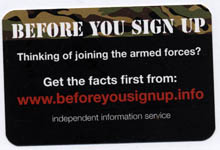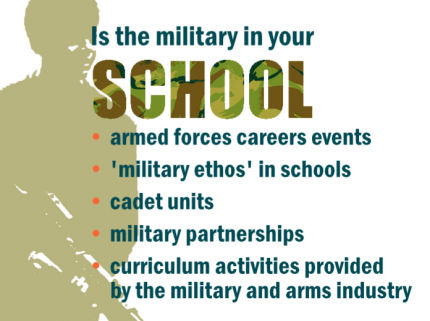Military power in British democracy
A consensus in Westminster on defence issues is failing to properly scrutinise the impact of the armed forces, the arms industry, defence partnerships and novel military tech initiatives on society. We’re investigating points where the military and defence industry leverage undue influence, with implications for democracy, war and security in the UK.
This project is funded for 2024-25 by the Joseph Rowntree Charitable Trust and the Network for Social Change.
The military in society
ForcesWatch observe and respond to ways in which the military is being promoted as a normal part of everyday life. We believe that uncritical support for the armed forces stifles concerns about how young people are recruited and limits debate on alternatives to war.
There is concern that some government initiatives, such as Armed Forces Day, seek to manufacture a climate of uncritical national pride in the armed forces in order to garner public support for foreign policy. Policies promoting the interests of the armed forces are embedding the military into many of our civilian institutions.
Armed conflict causes enormous damage to all involved; widespread public debate about the role of the armed forces and their recruitment practices is therefore vital.
The military in education
The UK armed forces visit thousands of schools each year. They offer career presentations, curriculum resources and other activities aimed at promoting the interests of the military and long-term recruitment. Since 2012, the Department for Education have promoted ‘military ethos’ programmes such as cadet units in state schools and ‘alternative provision with a military ethos’.
The armed forces and arms companies are increasingly involved in the provision of STEM (science, technology, engineering and maths) activities for school and college students. and they also sponsor a number of careers-led secondary schools. The armed forces also now sponsor youth organisations like Girlguiding and Scouts. See more here.
Should the armed forces by given access to children within education? How can we challenge their activities in schools and colleges? How can a more balanced view of the military be given to young people?
Military recruitment and service
- Young people are not adequately supported to make an informed choice about enlistment, and a sanitised or glamourised view of military life and warfare is promoted.
- The armed forces target recruitment activities at children, and are involved in education and youth organisations.
- Military environments are not suited to recruits under the age of 18, and the armed forces do not accept full duty of care obligations.
- Problems such as bullying and harassment are common in the armed forces.
- Armed forces personnel are subject to unduly restrictive terms and conditions of service.
- Too little recognition is given to the moral impact of military service and subsequent mental health problems.



